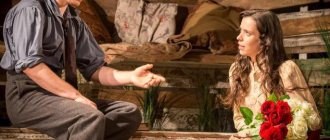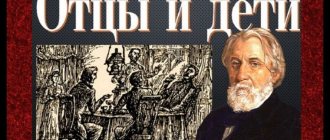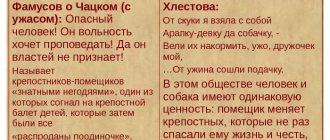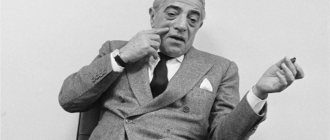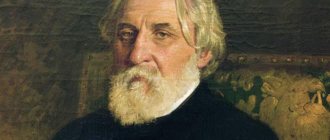- New! I. S. Turgenev’s novel “Fathers and Sons” was written in 1861 - at a time when the centuries-old foundations of Russia were changing. One of the themes of the work is the eternal theme of love. In the novel we see vivid love stories: the love story of Pavel Petrovich...
- New!
“In his works, he usually drew attention to the question that was next in line and was already vaguely beginning to worry society,” Dobrolyubov wrote about Turgenev, characterizing the writer’s extraordinary ability to respond to the “topic of the day.” Exactly…
Bazarov's philosophical views and their tests by life In the novel by I.S. Turgenev's "Fathers and Sons" depicts Russia in the late fifties of the nineteenth century, a time when the democratic movement was just gaining strength. And as a result of this there is...
I. S. Turgenev’s novel “Fathers and Sons” perfectly reveals the writer’s ability to guess “new needs, new ideas introduced into public consciousness.” The bearer of these ideas in the novel is the commoner democrat Evgeny Bazarov. The hero's opponent...
Pavel Petrovich Kirsanov, a man with a “dandy-dry” soul. The son of a military general in 1812, he graduated from the Corps of Pages, and a brilliant military career awaited him. An unsuccessful love for a woman with a “mysterious look,” Princess R., turned his whole life upside down….
In his novel “Fathers and Sons,” I. S. Turgenev, among other topics, raises the topic, so to speak, of false discipleship. From the first pages of the work we are introduced to two “good friends,” as Arkady Kirsanov calls himself and Bazarov...
The novel “Fathers and Sons” by I. S. Turgenev was written in a difficult era for Russia, in 1861. The period of its operation was 1855-1861 - the period when the war lost by Russia with Turkey ended, the deceased Nicholas I was replaced by Alexander II.
Bazarov is a commoner. The novel opens with pictures of a pre-reform village: “The places they passed through could not be called picturesque... There were rivers with dug-up banks, tiny ponds with thin dams, and villages with low huts under dark, often half-scattered roofs, and crooked threshing sheds with walls woven from brushwood and yawning gates near empty barns, and churches, either brick with plaster falling off here and there, or wooden with leaning crosses and ruined cemeteries... As if on purpose, the peasants came across all shabby, wearing bad nags; roadside willows with stripped bark and broken branches stood like beggars in rags; emaciated, rough, as if gnawed, cows greedily nibbled grass in the ditches. It seemed that they had just escaped from someone’s menacing, deadly claws - and, caused by the pitiful appearance of exhausted animals, in the middle of a red spring day, the white ghost of a cheerless endless winter with its blizzards, frosts and snows arose. And this author’s appeal to pictures of nature is not accidental. The reader sees destruction and desolation everywhere; poverty and mismanagement. And even Arkady admits that “transformations are necessary” in the village. We are talking about the reform of 1861, which essentially did not change anything in the situation of the peasants.
Of all the heroes, Bazarov is closest to the people. More than once throughout the novel he emphasizes his “multi-Chin” origins and calls himself a doctor, a doctor’s son. Talking to Pavel Petrovich Kirsanov, he “answers with arrogant pride”: “My grandfather plowed the land... Ask any of your men which of us - you or me - he would most likely recognize as a compatriot. You don’t even know how to talk to them.”
Bazarov is right. Pavel Petrovich not only doesn’t know how to talk to them, but he also doesn’t know how to manage his men...
M. Gorky wrote: “In Bazarov’s relations with the common people, one must notice, first of all, the absence of any pretentiousness, any sweetness. The people like it, and that’s why the servants love Bazarov, the kids love him, despite the fact that he doesn’t treat them at all and doesn’t shower them with money or gingerbread... The men have a heart for Bazarov, because that they see in him a simple and intelligent person, but at the same time this person is a stranger to them, because he does not know their way of life, their needs, their hopes and fears, their concepts, beliefs and prejudices.” One cannot but agree with the opinion of M. Gorky. Bazarov is actually loved in the Kirsanovs’ house: “Everyone in the house got used to him... The servants also became attached to him, although he made fun of them: they felt that, after all, they were their brother, not a master. Dunyasha willingly giggled with him and looked sideways at him, running past like a quail; Peter, an extremely proud and stupid man... - and he grinned and brightened as soon as Bazarov paid attention to him; the yard boys ran after the “doh-tour” like little dogs.”
A clear indication of the connection with the people is the speech of the heroes. Pavel Petrovich uses a lot of foreign words, deliberately distorts them, pronounces them in his own manner (“principles”, “eftim”). Bazarov’s speech is characterized by simplicity, precision and accuracy of expressions, many proverbs and sayings (“the song is sung”, “Moscow burned down from a penny candle”, “we have heard this song many times”, “there goes the road”) .
Bazarov honestly wants to help the people: “I want to mess with people, even scold them, and mess with them.” But proof that Evgeny still does not quite understand the needs of the peasants can be seen in the scene of Bazarov’s conversation with a man on his father’s estate, after which the man speaks about him: “... so, he was chatting about something; I wanted to scratch my tongue. It is known, master; Does he understand?" And the author adds: “Alas! Bazarov shrugged his shoulder contemptuously, knew how to talk to the peasants... and did not suspect that in their eyes he was still something of a fool..."
We see that Bazarov is lonely. He is not understood in the Kirsanov family, Odintsova rejects him, and he himself is not interested in being with his parents; The last thing is cutting off from the people. What is the reason for his loneliness? Bazarov is a representative of an early revolutionary commoner, one of the first in his field, and it is always difficult for people of the new generation, because they are the first.
The consciousness of the people has not yet matured to understand the idea of common nihilists, and Bazarov himself understands this in the end. Dying, he says: “...Russia needs me... No, apparently I’m not needed...”
However, I. S. Turgenev sees the doom of his hero not in the inability to find a common language with a man. He has no positive program, he only denies; The hero's internal conflict is another reason. But even before death, the hero remains as he always was: doubting, not afraid to be weak, sublime, able to love, and this is his uniqueness.
You have neither insolence nor anger, but only youthful courage and youthful enthusiasm.
It is better to break stones on the pavement than to allow a woman to take even the tip of a finger.
If you decide to mow everything down, kick yourself too!
If a woman can hold a conversation for half an hour, this is a good sign.
You can’t undo the past...
It's amazing how people still believe in words.
There is no need to hesitate; Only fools and smart people procrastinate.
Since I’ve been here, I’ve been feeling really bad, as if I’ve read Gogol’s letters to the Kaluga governor’s wife.
As for time, why will I depend on it? It’s better to let it depend on me.
The only good thing about a Russian person is that he has a very bad opinion of himself. The important thing is that two and two make four, and the rest is all nonsense.
The old joke is death, but a new one for everyone.
There is no need for you to get excited, because I don’t care at all. A romantic would say: I feel that our paths are starting to diverge, but I’m just saying that we’re tired of each other.
When I meet a person who would not give up in front of me, then I will change my opinion about myself.
There are not as many of us as you think.
A decent chemist is twenty times better than any poet.
Flying fish can stay in the air for a while, but soon they must splash into the water.
Nature is not a temple, but a workshop, and man is a worker in it.
Such a rich body! At least now to the anatomical theater.
A man who staked his entire life on a woman’s love and, when this card was killed, became limp and sank to the point that he was incapable of anything, such a man is not a man, not a male.
Maybe, for sure, every person is a mystery.
Yes, go ahead and try to deny death. She denies you, and that's it!
There was an empty space in the suitcase, and I put hay in it; It’s the same in our life’s suitcase: no matter what they fill it with, as long as there is no emptiness.
A person is able to understand everything - how the ether trembles and what happens in the sun; but how a person can blow his nose differently than himself, he is not able to understand.
He who is angry at his pain will certainly overcome it.
A real person is not one about whom there is nothing to think, but who must be obeyed or hated.
All people are similar to each other both in body and soul; each of us has the same brain, spleen, heart, and lungs; and the so-called moral qualities are the same for everyone: small modifications mean nothing.
Every person must educate himself, well, at least like me, for example...
I don’t share anyone’s opinions; I have mine.
Blow on the dying lamp and let it go out.
Quotes from Pavel Petrovich Kirsanov
“We, people of the old century, believe that without principles... you can’t take a step, you can’t breathe.”
Personality, dear sir, is the main thing; The human personality must be as strong as a rock, for everything is built on it.
They [the Russian people] sacredly honor traditions, they are patriarchal, they cannot live without faith.
The young people were delighted. And in fact, before they were just idiots, but now they suddenly became nihilists.
A thought occurred to me; Why not express it?
Either I'm stupid or this is all nonsense.
We cannot understand each other; I, at least, do not have the honor to understand you.
LITERATURUS: World of Russian Literature
Quotes from Pavel Petrovich Kirsanov “... without self-esteem, without self-respect - and in an aristocrat these feelings are developed - there is no solid foundation.
<.> .public building.” () “.Personality.
<.> .here is the main thing; The human personality must be as strong as a rock, for everything is built on it.” “...aristocratism is a principle, and in our time only immoral or empty people can live without principles.” “.No, the Russian people are not what you imagine them to be. He sacredly honors traditions, he is patriarchal, he cannot live without faith.” “...let us begin to fulfill our duty; and look, we will also get happiness into the bargain.” Quotes from the author “Time (a well-known thing) sometimes flies like a bird, sometimes it crawls like a worm; But it feels especially good for a person when he doesn’t even notice whether it passes quickly or quietly.” (author) “The appearance of vulgarity is often useful in life: it weakens strings that are too highly tuned, sobers up self-confident or self-forgetful feelings, reminding them of its close kinship with them.” “...began to get fat, like every Russian who finds himself in the “free bread” gets fat.” “...I silently marveled at the vitality of old feelings in a person.” “.So people on a ship, at sea, talk and laugh carefree, as if on solid ground; but if the slightest stop occurs, the slightest sign of something unusual appears, and immediately an expression of special anxiety will appear on all faces, indicating a constant consciousness of constant danger.” Quotes from other heroes “...for a thinking person there is no backwater.” (, Eugene’s father) “...in the feeling of a person who knows and says that he is poor, there must be something special, some kind of vanity.” () “.You deny everything, or, to put it more precisely, you destroy everything... But you also need to build.” () These were quotes from the novel “Fathers and Sons” by Turgenev: interesting statements by Yevgeny Bazarov, the Kirsanov brothers and other characters. See:
Views of Bazarov and Kirsanov (table) 1) on the role of the nobility 2) nihilism 3) on views of the Russian people 4) attitude towards art and nature
The answer was left by Guest Views of Bazarov and Kirsanov.1.
About the role of the nobility.B.: Believes that aristocrats are not capable of action, and that there is no benefit from them.
Completely rejects liberalism, denies the ability of the nobility to lead Russia to a bright future. “The so-called progressive people and accusers are no good. We talk about some kind of art, unconscious creativity, about parliamentarism, about the legal profession and God knows what, when it comes to our daily bread, when the grossest superstition is strangling us, when all our joint-stock companies are bursting up solely because there is a shortage of honest people , when the very freedom that the government is busy about will hardly benefit us, because our peasant is happy to rob himself just to get drunk on dope in a tavern.” K.: Believes that aristocrats are the driving force of social development.
The ideal of the nobles is “English freedom” (constitutional monarchy), and the path to the ideal is liberal (reforms, openness, progress). He believes that “... without self-esteem, without self-respect, and in an aristocrat these feelings are developed, there is no solid foundation for a social building. Personality... that’s the main thing.” He himself “organized his whole life according to English tastes, rarely saw his neighbors.”2.
Nihilism.B.: Speaking about the denial of everything, Bazarov means religion, the autocratic serfdom, and generally accepted morality. He asserts the need for revolutionary actions, the criterion of which is benefit to the people.
He says this: “We act because of what we recognize as useful.
In this day and age, the most useful thing is denial. We deny.” K.: Condemns nihilists for the fact that they “respect no one” and “live without principles.” He believes that these same nihilists are only “four and a half people.”3.
About views on the Russian people.B.: “My grandfather plowed the land.
Ask any of your own men which of us - you or me - he would rather recognize as a compatriot.
You don’t even know how to talk to him.” - said Bazarov. And at the same time he despised the people. K.: “...he,
Quotes from Arkady Kirsanov
We need to arrange our lives in such a way that every day is significant.
A maple leaf, when it falls to the ground, looks like a butterfly, and this is strange - because the driest and deadest is similar to the most cheerful and lively.
Ivan Sergeevich Turgenev wrote the novel “Fathers and Sons” at a difficult time for our country - in 1861. The action of the work takes place in 1855-1861. In those days, the war with Turkey ended, which Russia lost, and Alexander II replaced the deceased ruler Nicholas I.
Let us consider in this article Bazarov’s attitude towards the Russian people. After all, through this hero the problem of serfdom and the plight of the Russian peasant are addressed.
The meaning of the conflict between Bazarov and the Kirsanov brothers
One of the most important features of Ivan Sergeevich Turgenev’s work is the desire to understand everything that is happening in the country.
A striking work that reflected an entire stage in the historical development of Russia in the second half of the 19th century was the novel “Fathers and Sons.” The title of the work suggests that it will resolve the eternal issue - the contradictions between generations, and it is raised by the author, but in fact the writer is concerned about something else.
Fathers and sons are those who live in the thoughts of the passing generation, and representatives of new ideas, directions, thoughts, new people born of a new time. In the novel, Turgenev tries to understand and comprehend the purpose of life, the worldview of this new man, a commoner by origin, a democrat by political views.
The novel “Fathers and Sons” shows the struggle between the worldviews of two political directions - liberal nobles and democratic revolutionaries. The plot of the novel is built on the opposition of the most active representatives of these directions - the commoner Bazarov and the nobleman Pavel Petrovich Kirsanov.
In addition to this main problem, Turgenev raises a number of other issues related to the moral, cultural, socio-economic development of Russia in the 60s of the 19th century. Turgenev raises questions that worried the progressive people of that time: what is the difference between revolutionary democrats and liberals; how to treat the people, work, science, art; what changes are needed in agriculture and the economy?
The author shows us three disputes between E. Bazarov and P. Kirsanov, in which these questions are raised. So, the theme of the nobility, its role in life. According to Pavel Petrovich, aristocrats are the driving force of social development. Their ideal is “English freedom” (constitutional monarchy); the path to the ideal is liberal (reforms, openness, progress).
In appearance and by conviction, Pavel Petrovich is an aristocrat.
True, as Pisarev writes, “to be honest, he has no convictions, but he has habits that he values very much” and “out of habit” proves the need for “principles” in disputes.
Views of Bazarov and Kirsanov (table) 1) on the role of the nobility 2) nihilism 3) on views of the Russian people 4) attitude towards art and nature
Views of Bazarov and Kirsanov (table) 1) on the role of the nobility 2) nihilism 3) on views of the Russian people 4) attitude towards art and nature Views of Bazarov and Kirsanov.1.
About the role of the nobility.B.: Believes that aristocrats are not capable of action, and that there is no benefit from them. Completely rejects liberalism, denies the ability of the nobility to lead Russia to a bright future.” The so-called progressive people and accusers are no good. We talk about some kind of art, unconscious creativity, about parliamentarism, about the legal profession and God knows what, when it comes to our daily bread, when the grossest superstition is strangling us, when all our joint-stock companies are bursting up solely because there is a shortage of honest people , when the very freedom that the government is worried about is unlikely to be of any use to us, because our peasant is happy to rob himself just to get drunk on dope in a tavern.” K.: Believes that aristocrats are the driving force of social development.
The ideal of the nobles is “English freedom” (constitutional monarchy), and the path to the ideal is liberal (reforms, openness, progress).
He believes that “without self-esteem, without self-respect, and in an aristocrat these feelings are developed, there is no solid foundation for a social building. Personality is the main thing.” He himself “organized his whole life according to the English taste, rarely saw his neighbors.” 2. Nihilism.B.: Speaking about the denial of everything, Bazarov means religion, the autocratic serfdom, and generally accepted morality. He asserts the need for revolutionary actions, the criterion of which - benefit for the people.
He says this: We act because of what we recognize as useful.
In this day and age, the most useful thing is denial.
We deny.K.: Condemns nihilists for the fact that they “respect no one”, “live without principles.” He believes that these same nihilists are only “four and a half people.” 3. About views on the Russian people. B.: “My grandfather plowed the land.
Ask any of your men which of us - you or me - he would rather recognize as a compatriot.
Origin of Bazarov
Of all the characters in the novel, the closest to the peasantry is Yevgeny Bazarov. The attitude of this character towards the people largely determines his origin. Throughout the work, he repeatedly emphasizes that he is a commoner and calls himself a doctor’s son, a doctor. In a conversation with Pavel Petrovich Kirsanov, Evgeny Bazarov replies with pride that his grandfather plowed the land, so the man is more likely to recognize him as a compatriot than Pavel. Kirsanov, says Evgeniy, doesn’t even know how to talk to peasants. However, can Bazarov himself do this? This hero’s attitude towards the people (quotes from the text only confirm this) was not simple either.
But Evgeny is right. Pavel Petrovich really not only cannot communicate with his men, but also manages them.
Bazarov and Kirsanov: disputes about life, culture, principles
March 30, 2021 Discuss 0 0 which form the ideological basis of the famous novel by the famous writer I.
Turgenev's "Fathers and Sons" are ideological opponents in this work.
Both personify different worldviews, which are fundamentally different from each other.
The first is a nihilist commoner, a materialist in his views on the world, the second is an aristocrat in spirit and by blood, a conservative by nature. Such different personalities, of course, could not find a common language, and this led to an ill-fated duel between them. Bazarov and Kirsanov, whose disputes served as the basis for the conflict between these heroes, belonged to different social groups.
The first came from the family of a simple district doctor.
He spent his whole life at work and did not tolerate free time, which, in fact, is what Pavel Petrovich did. Bazarov studied a lot and was engaged in science. In addition, the author makes it clear to the reader: he did not disdain physical labor. Kirsanov, on the contrary, was left to his own devices.
He didn't bother himself with any activities. The son of a military officer, an aristocrat and nobleman, Pavel Petrovich led an idle lifestyle in the village.
Such different positions led to their first clash, which revealed deeper differences between them. Bazarov and Kirsanov, whose disputes concerned the most important aspects of human existence, on the very first evening of their acquaintance experienced a lively hostility towards each other. During a general conversation, both discovered completely different views on the principles of human existence.
Kirsanov argued that a person should be guided in life by clearly developed principles. Bazarov, on the contrary, believed that one should accept only what is practically useful. Pavel Petrovich defended the exclusive right of the aristocracy to a leading position in society: in his opinion, the nobles earned the right to be at the top of society not by noble origin, but by deeds.
Evgeny Vasilyevich does not accept any authority. The two main opponents in the novel “Fathers and Sons” are Bazarov and Kirsanov.
How does Evgeny Bazarov behave with peasants?
The situation of the peasants in Bazarovo evokes not tenderness, but only anger. This hero soberly assesses the people and their strengths: he sees superstition, lack of education, discontent and downtroddenness. Unlike Pavel Petrovich, who affectionately calls the people pious, patriarchal, but sniffs cologne when talking to them, Evgeny does not keep his distance from the peasants. The Kirsanov brothers, landowners, are incapable of running a household and do not know how to organize things on their estate. Their household creaked and crackled, “like an unoiled wheel.”
The ambiguity of perception of Bazarov by peasants
Bazarov sincerely wants to help the peasants. He wants to “at least scold them,” but “mess around” with the men. But Evgeniy still does not fully understand the needs of this segment of the population, evidence of which is the scene of Evgeniy’s conversation with a peasant, which took place on his father’s estate, after which the peasant responded to him like this: “so, he was chatting something.” The author notes that Bazarov, who knew how to talk with men, did not even suspect that in the eyes of the latter he was “something like a fool.” Bazarov’s special attitude towards the people still does not help him fully understand the peasants.
Eugene's loneliness
As we see, Evgeniy is lonely. The Kirsanov family does not understand him, his beloved Odintsova also rejects him, the hero is not interested in his parents, and to this is added his cutting off from the people. Why did this happen, what is the reason for Bazarov’s loneliness? This person is one of the representatives of the type of early common revolutionary, and it is always difficult for the new generation to pave the way, because nothing illuminates it, they have to go at random.
The consciousness of the masses has not yet matured to understand the revolutionary idea of the nihilistic raznochintsy, and at the end of the work Evgeniy himself understands this. He says, dying, that Russia does not need him.
Bazarov: attitude towards the people
The quotes from the work given above prove that Bazarov’s relationship with the peasants was by no means straightforward. Ivan Sergeevich Turgenev, however, sees the main reason for the hero’s doom in his ability to find an approach to a man. In fact, it is that he does not have any positive program, he only denies, therefore another important reason for loneliness is the internal conflict that Bazarov is experiencing. This hero’s attitude towards the people is thus tragic - he sees the needs of the peasants, but cannot change anything. But even in the face of death, Eugene remains as he was: not afraid to be weak, doubtful, able to love, sublime, and this is his uniqueness and attractiveness.
Aphorisms about nihilism
“A nihilist is a person who does not bow to any authority, who does not accept a single principle on faith, no matter how respectful this principle may be.”
“It’s amazing how a person still believes in words.” “There’s no need to hesitate; Only fools and smart people procrastinate.”
“As for time, why will I depend on it? It’s better to let it depend on me.”
“The only good thing about a Russian person is that he has a very bad opinion of himself. The important thing is that two and two make four, and the rest is all nonsense.”
“When I meet a person who would not give up in front of me, then I will change my opinion about myself.”
“We are not as few as you think.”
“A decent chemist is twenty times better than any poet.”
“Perhaps, for sure, every person is a mystery.”
“Yes, go ahead and try to deny death. She denies you, and that’s it!”
“There was an empty space in the suitcase, and I put hay in it; It’s the same in our life’s suitcase: no matter what they fill it with, as long as there is no emptiness.”
“A person is able to understand everything - how the ether trembles and what happens in the sun; but how a person can blow his nose differently than himself, he is not able to understand this.”
“He who is angry at his pain will certainly overcome it.”
“A real person is not one about whom there is nothing to think, but who must be obeyed or hated.”
“All people are similar to each other both in body and soul; each of us has the same brain, spleen, heart, and lungs; and the so-called moral qualities are the same for everyone: small modifications mean nothing.”
“...our peasant is happy to rob himself just to get drunk on dope in a tavern...”
“As a result of a penny candle, you know, Moscow burned down...”
“Every person hangs by a thread, an abyss can unfold beneath him every minute, and yet he invents all sorts of troubles for himself, ruining his life.”
“There are no principles...there are feelings. Everything depends on them.”
“Fix society, and there will be no diseases.”
“We act because of what we recognize as useful.”
